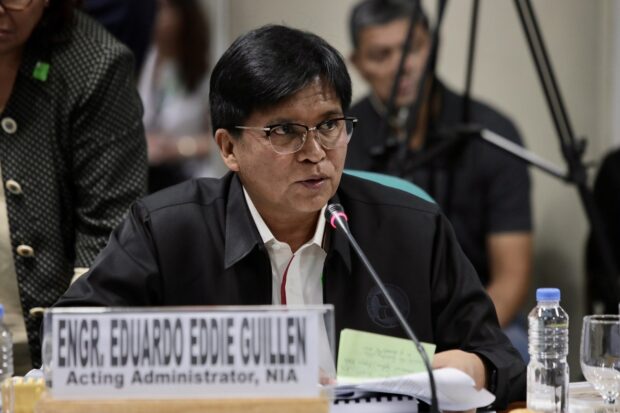
Acting National Irrigation Administration (NIA) chief Eduardo Guillen)—Senate PRIB
Acting National Irrigation Administration (NIA) chief Eduardo Guillen conceded on Friday that irregularities at the agency have spawned corruption and delayed key irrigation projects.
But he said he has been trying to address the issue since he was named to the post last December.
“I am not saying that NIA is perfect,” said Guillen, a former mayor of the farming town of Piddig, Ilocos Norte, who got an earful from senators during a blue ribbon probe on the agency last month.
“In fact, we have already launched an investigation to look into anomalies within the agency,” Guillen said in an interview with the Inquirer on Friday.
Guillen noted that the long-standing corruption stemmed not only from inherently dishonest officials, but also from a poorly managed process that allowed red tape to multiply and fester.
“The volume of documents we receive for one project alone can almost fill a pickup truck,” said Guillen, a civil engineer by profession.
The agency is now trying to streamline the process to ensure the timely completion of irrigation projects.
On average, it previously took at least two to three years to finish an irrigation project, but the agency now expects projects to be completed sooner, because NIA has cut the preparatory work so that it can be finished in four months.
Proponents of small irrigation projects, for instance, are no longer required to submit feasibility studies.
“I also removed or reduced redundant documentary requirements,” Guillen said, adding that he also reduced the number of signatures required on a project and decentralized the authorized signatories.
The NIA central office in Quezon City, for instance, will no longer approve the implementation of irrigation projects, but only facilitate requests for the extension of contract time.
But red tape is not the only problem, Guillen said, noting that corrupt practices have entrenched incompetent managers and their favored contractors.
“First, we have a shortage of contractors. Good contractors don’t like it here, so we end up with those who are just looking for irrigation projects and offer [unrealistically] low construction costs,” he added.
While the NIA has not been telegraphing its moves against corrupt officials, Guillen said he is building up cases to be filed before the Ombudsman after due process.
He also asked all contractors with delayed projects to submit catch-up plans in deference to the criticisms of senators and the Commission on Audit.
Moreover, Guillen said he also regulated the extension of contract completion deadlines.
“I only allow district offices to issue time extensions of 60 days. Beyond that timeframe, contractors should go to the regional office. After 90 days, they should make the request to the central office,” he said.